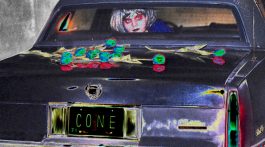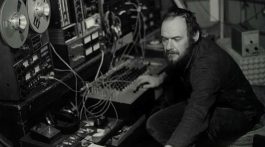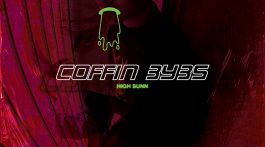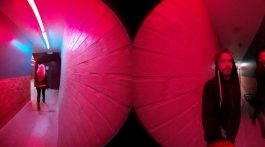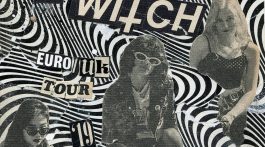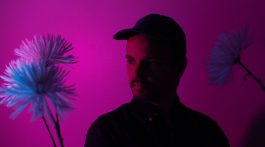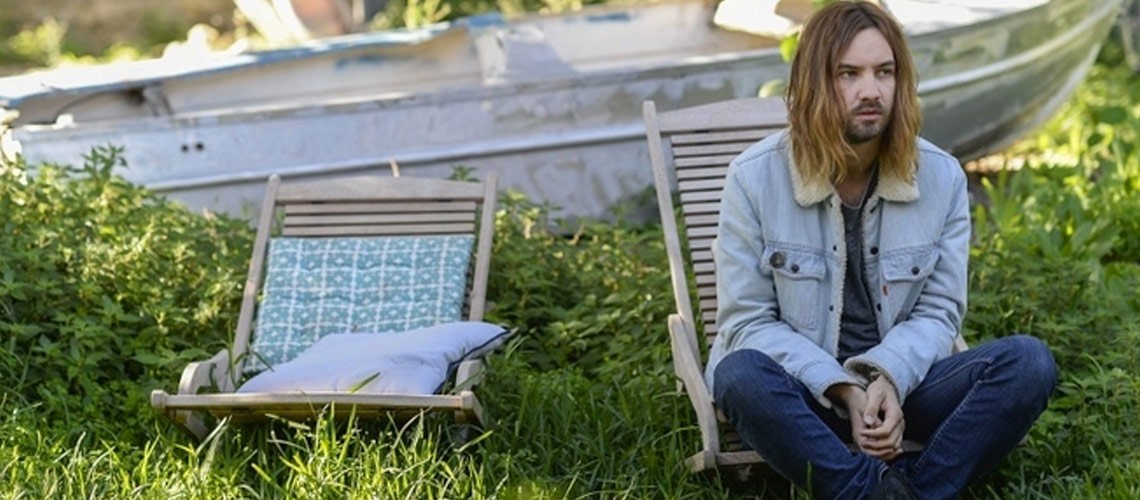Tame Impala frontman Kevin Parker at home in Fremantle. Picture: Iain Gillespie/The West Australian
Kevin Parker’s hair flows majestically over his shoulders, the Tame Impala frontman depicted as a Norse god or surfer himbo, as psychedelic rainbow riffs explode from his guitar.
The impressive piece of fan art — possibly a gift from a recent tour of South America, where fans are particularly passionate about the Perth psych-rock band — sits among other colourful tributes inside the 29-year-old’s South Fremantle home.
A framed Time magazine with rapper Kanye West on the cover hangs nearby. Parker is a fan of the controversial hip-hop superstar — he recently took proud ownership of a signed set-list — but not as fervent as his girlfriend Sophie Lawrence, who works for a Perth advertising firm.
The celebrated musician continues the tour past magazines stacked neatly on a coffee table surrounded by a few empty wine bottles and bespoke ashtrays, and out to the dishevelled backyard.
Where one might assume a successful rock star would sink their gold-plated swimming pool, a ramshackle enclosure for rabbits or chickens lies empty, aside from tangled wire and long grass.
Parker has no time for gardening. Most of his time at home is spent in the studio, consisting of a room full of guitars, another bursting with synthesisers and recording gear, plus a makeshift storeroom for stage lights, so he can work on Tame Impala’s live show as well as the music that has made the band one of the hottest rock acts on the planet.
He did manage to give an outside wall one coat of pink paint before embarking on their recent five-week US tour, which culminated in a breathtaking late-afternoon performance to about 50,000 fans at the Governors Ball in New York.
Tame Impala’s third album Currents, released on Friday, could well be the biggest album ever released by a WA act in terms of sales and pure unadulterated buzz. The album, which UK music bible NME described as “astronomically anticipated”, is expected to easily eclipse the band’s previous outing, the ARIA Award-winning and Grammy-nominated Lonerism, which has sold more than 200,000 copies in the US.
Parker wrote, performed, recorded, produced and mixed the new album in his modest home studio. The appropriately titled Lonerism and equally inward-looking 2010 debut Innerspeaker, which features the apt Solitude is Bliss, were also almost entirely solo creations.
“It’s not like I’m brooding or miserable or withdrawn, ” Parker once told British music magazine Uncut. “I’m just happier on my own.”
Parker was born in Sydney but raised in WA. His parents split when he was three and, after initially living with his mother Rosalind, he moved in with his father Jerry, elder brother Stephen and stepmother Rhonda, who lived in Cottesloe.
His dad, an accountant and “closet musician”, owned plenty of instruments as well as an impressive record collection dominated by the Beatles, the Beach Boys, the Shadows and Supertramp.
While Parker learnt guitar and the drums from a young age, the big bang for the future globetrotting rocker came in the late 90s, when he worked out how to capture his sonic experiments.
He taped himself bashing away on his dad’s drum kit on the home stereo, then cajoled a melody out of a Casio keyboard as the drum loop played, recording both on a second tape deck. And so it went — more layers, more tapes. The rudimentary results left the junior George Martin’s “mind blown”.
“My world opened up in terms of music, ” Parker says in a South Fremantle cafe, where no one gives the world-famous muso a second glance. “I didn’t need other people.”
Initially, he kept these early songs to himself but eventually shared a few with his best mate and now Tame Impala guitarist, Dominic Simper.
The pair became friends during Year 9 music lessons at John XXIII College in Mt Claremont. “It became instantly obvious that we were the only two people in the class who could play their instruments and cared about music, ” Simper says from Leuven, in the Flemish part of Belgium, where he moved recently with his Dutch girlfriend.
Simper and Parker would thrash Nirvana and Rage Against the Machine covers, before Parker began to reveal his homemade recordings. “He’d do it all on his own at home and not even give me a glimpse until he was satisfied that it was finished, ” Simper says. “It was much like it is now.”
Later they played in the Dee Dee Dums, runners-up in the 2005 Ampfest battle of the bands to fellow travellers Mink Mussel Creek. The two bands merged and Tame Impala evolved out of “a big collection of Perth freaks”, as Simper puts it, in late 2007.
Tame Impala in concert and on record are two completely different projects. Simper says Parker’s touring buddies don’t mind that the recordings are a one-man show. “All the guys in the band are completely free to pursue any creative projects they want to, ” he says. “There’s no reason we’d feel creatively stifled or anything.”
The members of Tame Impala are not only involved with other bands, they’re spread out across the globe. London-based guitarist/keyboardist Jay Watson has his Gum solo project, and plays in Pond with former Tame Impala member Nick Allbrook. Bassist Cam Avery, who is living in Los Angeles, leads blues-rockers the Growl and occasionally plays in Pond. (Parker has also played drums with Pond and produces their albums.) Originally from Toulouse, France, drummer Julien Barbagallo now lives in Melbourne.
None of the other projects can match Tame Impala for popularity or acclaim, however. The figurehead of this music-obsessed collective, Parker is frequently described as a genius for his futuristic yet reverential take on trippy guitar-based pop.
When Tame Impala trumped much-fancied, electronic boy wonder Flume at the 2013 ARIA Awards to win album of the year, plus best group and best rock album for Lonerism, Avery paid tribute to Parker on national TV.
“The album Kevin wrote himself, it not only impressed everybody else, it impressed us a whole bunch as well, ” the bassist said of the album ranked the best of 2012 by NME, Rolling Stone and Triple J. “He’s a prolific, amazing musician and we all appreciate being part of his life.”
Simper says labelling Parker as a musical genius doesn’t give his close friend enough credit for the sheer hard work put into these seemingly spontaneous sonic creations.
“He’s a very rational, scientific guy, ” the guitarist says. “He’s freakishly talented but it’s also hours and hours of work.”
Simper concedes Parker has the X factor. “There has to be something else because his music makes a connection with people that you can’t quantify.”
Parker’s longest-serving cohort continues to act as a sounding board. Simper says he was left “literally speechless” last year when he first heard the sprawling eight minutes of Let it Happen, the first single from Currents.
“I got to listen to (the songs) as if I was a fan, ” he says. “They’re on a different level of songwriting and craft that he hasn’t shown before.”
Parker may work in much the same way as he has done since childhood but the results are in a different universe.
Yes, I’m Changing — a highlight of the new album — acknowledges that the touring, awards and adulation from fans, critics and fellow musicians have to have some impact. “They say people never change but that’s bulls…, they do, ” Parker croons in the electronic ballad.
“Generally, the right thing to say is, like ‘Oh no, this isn’t changing me, I’m still the same old bloke’, and try to deny that the excessive amount of travelling or success aren’t changing you, ” he says, sipping on a long mac. “In the end, it does. It makes you see things differently. It completely rearranges your view on life.”
Parker believes the evolution from bedroom recordings to bands formed in Daglish and Shenton Park share-houses to international rock stardom has had a positive influence, citing his new-found self-respect as the biggest personal shift.
“I never used to think I had anything to say or my output amounted to anything, ” he says. “I always assumed that whatever was going on in my head was completely removed from any relevance to anyone else.
“I always assumed it was a total fluke, ” he laughs, “that I made any music that resonated with anybody.”
That’s despite Tame Impala almost immediately attracting famous friends, including Flaming Lips leader Wayne Coyne and superstar producer Mark Ronson. The latter enlisted Parker to sing on three tracks from his recent album, Uptown Special. After joining him on stage at last month’s Glastonbury festival in the UK, Parker will tour Australia with Ronson this month, including a Perth gig on July 22.
Ronson, who scored a global smash hit with Uptown Funk last year, is a massive fan of Parker. The London-born producer told The West Australian in February that the Tame Impala sound was already hugely influential and “his biggest records are yet to come. The groundswell of love and admiration for the band is pretty unparalleled, I think.”
“That was happening from day dot, ” Parker says of the big-name support. “One of the first gigs we ever played in London, Noel Gallagher and Noel Fielding came and a bunch of other high-profile people.”
Dreamy single Feels Like We Only Go Backwards won APRA Song of the Year in 2013 but not even that peer-voted honour means as much to Parker as the growing numbers of fans turning up at shows.
A new self-respect and confidence came from “going to countries on the other side of the world and seeing people devoted to what you’re doing. It’s playing a song live and seeing people … literally in tears. That’s the most profound effect, not some famous person thinks you’re good.”
That poise led Parker to “expose himself” on Currents. After submerging his vocals on previous albums, the third outing boasts his most direct and audible lyrics. “Honesty is a surprisingly elusive quality in music, ” he says.
Parker’s first outing as a musician came mid-2008, when he was offered a record deal by Sydney-based label Modular. He immediately dropped out of an astronomy course at university, releasing a self-titled EP featuring indie hit Half Full Glass of Wine later the same year.
Tame Impala’s relationship with Modular, and its founder Stephen Pavlovic in particular, has since dissolved. Tame Impala publisher BMG had taken Pavlovic, the label and partner Universal Music to court for almost $600,000 in unpaid royalties from US sales.
Tame Impala manager Jodie Regan said from London on the eve of Parker’s Glastonbury appearance that “the Modular situation” had been brewing for at least two years. She is hell-bent on retrieving the money from Pavlovic, who is no longer employed by the label. (Like the royalties, the former Modular man is missing — Regan assumes he’s with family in Croatia.)
“Basically, the band has to win in this situation, ” says Regan, who has been based in Los Angeles since March last year. The major labels involved, German giant BMG and the band’s current home, Universal imprint Interscope, both stood to “make a lot more money out of Tame Impala. So can someone please take responsibility.”
However, she stresses the importance of not letting the ongoing legal battle detract from what Parker and his bandmates have achieved or could achieve in the future.
For his part, Parker says the Modular situation was “the storm on the horizon” but, after initially investigating for himself, he decided to leave the lawyers to sort it out.
“It really screwed with my creativity, ” he says. “All of a sudden they started talking about this album being worth this much and this album being worth this much … That whole world is so foreign to me.”
Parker remains remarkably sanguine about the alleged exploitation by the label that helped launch Tame Impala into the stratosphere. His glass is half full, not half empty.
“That’s the thing, ” he says. “I wouldn’t be where I am today if they hadn’t done that … if that’s the trade-off for me being able to make music for a living, release it and travel around the world, then that’s a f…ing fair trade-off. I’m happy with that.”
Parker relishes being able to play top festivals around the globe, including Australia’s own Splendour in the Grass later this month. Tame Impala knocked back Glastonbury this year, preferring a more prominent slot at the iconic festival in 2016. (The touring schedule is already pencilled in until August next year, according to Regan.)
In the end, however, the gigs and record deals are a sideshow to Parker’s solo explorations in the studio. While famed US producer Dave Fridmann helped him polish previous albums, Currents was done alone.
“Doing it on your own, you just go insane, ” Parker says at the cafe. “Your perspective goes out the window.” He admits to doing more than 1000 vocal takes on the R&B-influenced single Cause I’m a Man.
How do you know when a song is done? “You don’t, ” Parker laughs ruefully. “You just run out of time. You have someone pull the plug on it.”
Currents was due in January but the deadline was pushed back several times. Parker worked around the clock to complete the album before jetting out for Tame Impala’s performance at California’s Coachella Festival in mid-April.
“In the few months leading up to finishing, the album was all day, every day, ” Parker says. “There wasn’t even a consideration that I would do anything else. It wasn’t even like ‘It’s Friday night, I’m going out to have a drink with friends’. That didn’t even exist.
“All the time I was working as though the whole album was going to be done in a few days. Even when I wasn’t working on it, even when I was eating, I was thinking about the next thing or I’d fall asleep thinking about it and I’d wake up thinking about it.”
Parker isn’t quite like Beach Boys genius Brian Wilson, sitting at his grand piano in the sandpit trying to coax heavenly melodies out of a tortured psyche, but he says music is no longer simply for fun.
“It’s not really a pleasure these days, ” he admits. “It’s more instinctual. I wouldn’t know how to switch off if I tried. As soon as you conquer something, as soon as you satisfy yourself with one section of music another one opens up. It’s an infinite world of discovery and fulfilment.”
Perth’s musical mastermind will continue to push himself to the limit for the same simple reason he first pressed play and record simultaneously on his father’s tape deck. “I could be just around the corner from writing the best song I’ve ever written.”
Source: yahoo.com


